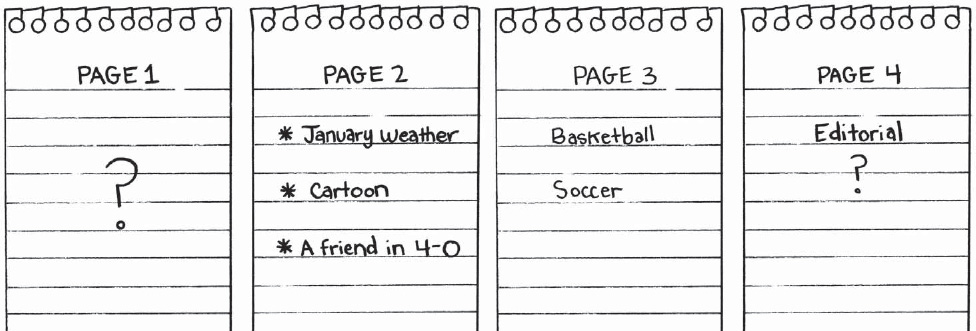The Candy Smash (2 page)
Authors: Jacqueline Davies

Mrs. Overton admitted that she had no idea what E.E. stood for, but she would find out and report back later. "In the meantime, let's take a look at the poem."
She turned the page on the easel to show the poem that she had copied out earlier.
Â
because it's
Â
Spring
thingS
Â
dare to do people
Â
(& not
the other way
Â
round)because it
Â
's A
pril
Â
Lives lead their own
Â
persons(in
stead
Â
of everybodyelse's)but
Â
what's wholly
marvellous my
Â
Darling
Â
is that you &
i are more than you
Â
& i(be
Â
ca
us
Â
e It's we)
Â
Evan stared at the poem. He hardly breathed. He had never seen anything like it. It was kooky! The way the words fell down the page like rocks tumbling over the edge of a cliff. He liked that "Spring" almost rhymed with "thingS" and the crazy way the tall, proud capital
S
s stood like towers on either side of those words. And why was the word "because" broken up into four pieces? It made him feel as if words weren't so strict and stern and unchangeable as they had always seemed. You could mix them up. You could rearrange them any way you liked. You could play with themâlike Legos! You could make them do whatever you wanted. Evan looked at that poem and felt something inside of him go
zing.
Jessie pointed at the easel. "That is the worst poem I have ever seen in my whole life!" she shouted. "That poem is
all wrong
."
"Wow," said Mrs. Overton. "It sounds like you're having a strong response to this poem, Jessie. Tell us what you think."
"It's full of mistakes," said Jessie, standing up and marching over to the easel. "That
S
is not supposed to be capitalized. You never capitalize just the last letter of a word. And there's a space missing after the parenthesis. And the words 'it's' and 'April' are broken up with no hyphens. And there's no such word as 'everybodyelse.' He just made that up!" Jessie's hands were flying all over the easel, pointing, accusing the poem. She stabbed her finger right into the heart of the poem. "And the word 'I' is always capitalized.
Always
."
Evan nodded his head. That was the rule.
"So why do you think he did it?" asked Mrs. Overton.
"Because he's dumb," said Jessie, returning to her spot on the rug and plopping down in disgust.
"Well," said Mrs. Overton, "Mr. Cummings graduated from Harvard and wrote his first book when he was twenty-eight. So I don't think he was dumb. Maybe he had a reason for writing his poems in this way. What do you think?"
The kids in 4-O stared at the poem. Some of them moved their mouths silently as they read it to themselves.
"Maybe he was telling a joke," said Tessa.
"Or maybe he was trying to make it look like a kid wrote it!" said Adam. "Maybe he was using a strong
voice,
like you told us about when we wrote our memory stories."
"I bet he just scribbled it out fast like that, and then he didn't bother to check it over," said Paul. Evan knew that Paul hated to copy his first drafts.
"These are all good ideas," said Mrs. Overton. "Anybody else have an idea?"
Evan looked at the poem and thought about the joy he felt when he read it, the looseness and freedom of those crazy mixed-up words, the tumbling recklessness of the way the poem spilled down the page.
"Maybe," said Evan, "he's sort of ... telling us that there aren't any rules or ... you know, you don't have to do things a certain way, just because that's how everyone else does them? You know?"
Mrs. Overton nodded her head. "I think that's exactly what Mr. Cummings is challenging us to think about. Rules and conventions. Because what is this poem
really
about?"
The whole class stared at the poem. The room was silent, except for the gentle scrabbling sound of the gerbils in their cage as they chewed on their toilet paper tubes. Slowly, Megan raised her hand, and Mrs. Overton nodded at her.
"It's about love," said Megan.
"That's right," said Mrs. Overton. She turned the heavy paper of the easel so that a fresh, blank page was showing, and then in all capital letters, she wrote,
Â

Smash
smash
(n) something that is wildly popular, an unqualified success, a blockbuster
Â
Jessie was the first to come in from morning recess, because Mrs. Overton had said she could return to the classroom five minutes early to work on her newspaper. If it were up to Jessie, she would skip recess every day. It was just a waste of time. She'd rather spend the time reading a book or working on a project. Running around outside! Ridiculous!
And speaking of ridiculous, Mrs. Overton had given them a new assignment: each one of them had to write a poem about something or someone they loved. A love poem! Fourth grade was definitely taking a turn for the worse.
Jessie sat down at her desk and pulled out her reporter's notebook. It was the same kind of notebook her father used: long and thin, spiral-bound, hard-covered, with light blue lines running across each narrow page. She liked using the same notebook he didâliked to think of both of them scribbling notes, writing articles, and changing the world. It made her feel closer to him, even though she hadn't seen him in over a year and he was halfway around the world.
Jessie moved her Valentine's shoebox to the corner of her desk, then tore out four pages from her reporter's notebook and spread them out. She picked up her pencil and wrote a list of the articles that would appear on each page.
Â

Â
Pages two and three were easy to fill because they contained the newspaper's regular features: the recap of the month's weather using all the data that 4-O collected from the weather station mounted on the roof of the gym; a comic strip about an alien, written and illustrated by Christopher Bay; a few sports articles written by different kids in the class who were on various town teams; and Megan's latest installment of her advice column, "A Friend in 4-O," the most popular feature in the newspaper.
Â
Dear Friend in 4-O,
Someone in my desk group keeps kicking my chair. I've asked him to stop about a million times, but he still does it. What is his problem????
Signed,
Tired of Being Kicked
Â
Dear Friend in 4-O,
My mom packs snacks I hate. No one will trade with me, these snacks are so bad. I'm always hungry until lunch.
Signed,
Starving and Sad
Â
Dear Friend in 4-O,
I don't get fractions! Seriously! No matter how many times Mrs. Overton explains them, I just don't get them. Help me!!!!
Signed,
The #1 Enemy of Fractions
Â
But Jessie still had no idea what her front-page story would be. And her dad had taught her that the front-page story was the most important part of the whole newspaper. She needed something that would really grab her readers' attention. Something shocking. Something huge. She was determined to make this edition of
The 4-O Forum
a smash, and to do that she needed a prizewinning front-page story.
Jessie knew she had to do some investigative reporting, which is when a reporter uncovers facts that no one else knows and publishes them so the world will be a better place. Jessie's dad had been an investigative reporter before he went back to being a war correspondent. Right now, he was in Afghanistan, but when Jessie was a baby, he had written articles about a big chemical company that was causing pollution and a state senator who was taking bribes. He'd won an important prize for writing the story about the senator, but he'd made a lot of people angry, too. Sometimes Jessie thought
that
was why he left.
Couldn't I investigate something?
she wondered.
Uncover a secret, just like Dad?
Too bad her friend Maxwell wasn't here. He was the best spy she'd ever met, not to mention an accomplished thief. If Maxwell were here, they would definitely find something to uncover.
I need a secret,
thought Jessie.
And a good one!
She didn't want her front-page story to be a flopâlike the last time.
In the last issue of
The 4-O Forum,
Jessie had interviewed the school principal, Mrs. Fletcher. Scott Spencer had said it was the most boring article he had ever
not read
. He pretended to fall asleep with the paper open in front of him. Most of the boys had thrown the paper in the recycling bin without even looking at it, and some of the girls had used theirs to make origami bracelets. The only article anyone had even talked about was the advice column. It made Jessie angry to think about that.
What could she investigate this time? Lots of ideas flashed in her brain: What was in Mrs. Overton's desk drawers? Were the cafeteria hot dogs really made of rubber? Why did the gym teacher leave in the middle of the school year? Who was responsible for the two fire alarms in January? And what made that funny smell down by the school boiler room? The principal said it was an outdated HVAC system that did a poor job of ventilating the school when it rained, but the boys claimed that the custodian had a dead body in there. David Kirkorian was the one who pointed out that the smell had started shortly after the gym teacher disappeared.
But Jessie couldn't actually investigate any of those mysteries. She couldn't break into Mrs. Overton's desk or ask questions about the gym teacher. (She had tried and was told firmly by the principal that it was none of her business.) She couldn't sneak into the boiler room. Jessie shuddered, thinking what it would be like to find a dead body.
Then Jessie thought of something her grandmother had said a few weeks ago when they had seen a news report about protesters occupying the State House: "You can't make an omelet without breaking some eggs."
"What the heck does that mean?" Jessie had asked.
"It means if you want to achieve something important, you might have to make a mess along the way. Ruffle a few feathers. Kick up some dust." Jessie looked blankly at her grandmother. "In other words, Jess, you can't always make everyone happy. Sometimes you have to do what you have to do."
"Grandma," Jessie said sternly. "Are you talking about breaking rules?" The thought of breaking rules made her feel lightheaded.
"Oh, rules," said Grandma. "When you get to be my age..."
Jessie stared at the empty pages in front of her and thought of her grandmother's words. Her dad broke rules all the time. He was always sneaking under fences and snooping through trash to uncover a story. Because he wanted to make the world a better place. Because he was a hero.
Just then Scott Spencer burst through the door, followed noisily by half a dozen other kids. Jessie jumped as if she'd been caught red-handed doing something illegal, accidentally knocking her Valentine's shoebox off the desk. It made a strange rattling sound as it fell, and when the lid came off, something unexpected spilled out.
Mushrooms Take Over the World
personification
(n) giving lifelike characteristics to an inanimate object or an abstract idea; describing an object as if it were alive